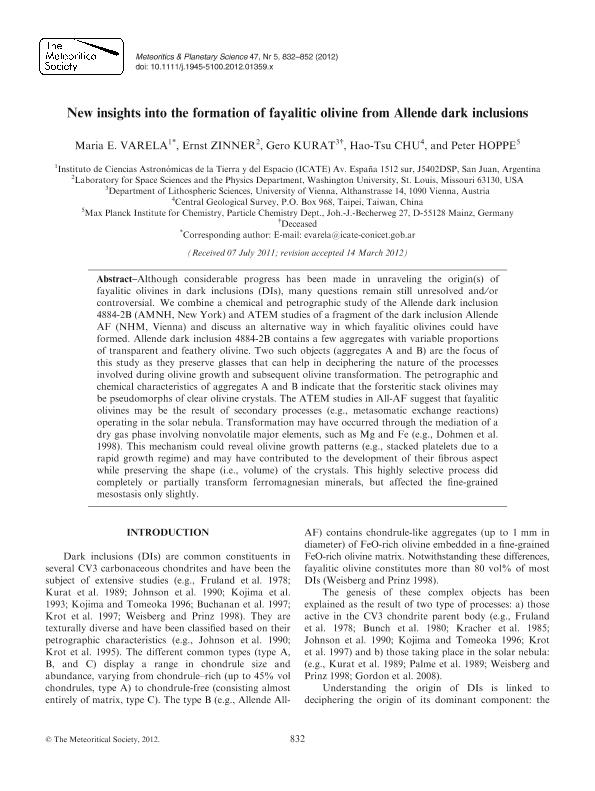Mostrar el registro sencillo del ítem
dc.contributor.author
Varela, Maria Eugenia

dc.contributor.author
Zinner, Ernst
dc.contributor.author
Kurat, Gero
dc.contributor.author
Chu, Hao Tsu
dc.contributor.author
Hoppe, Peter
dc.date.available
2019-02-01T18:05:05Z
dc.date.issued
2012-05
dc.identifier.citation
Varela, Maria Eugenia; Zinner, Ernst; Kurat, Gero; Chu, Hao Tsu; Hoppe, Peter; New insights into the formation of fayalitic olivine from Allende dark inclusions; Meteoritical Soc; Meteoritics & Planetary Science; 47; 5; 5-2012; 832-852
dc.identifier.issn
1086-9379
dc.identifier.uri
http://hdl.handle.net/11336/69199
dc.description.abstract
Although considerable progress has been made in unraveling the origin(s) of fayalitic olivines in dark inclusions (DIs), many questions remain still unresolved and/or controversial. We combine a chemical and petrographic study of the Allende dark inclusion 4884-2B (AMNH, New York) and ATEM studies of a fragment of the dark inclusion Allende AF (NHM, Vienna) and discuss an alternative way in which fayalitic olivines could have formed. Allende dark inclusion 4884-2B contains a few aggregates with variable proportions of transparent and feathery olivine. Two such objects (aggregates A and B) are the focus of this study as they preserve glasses that can help in deciphering the nature of the processes involved during olivine growth and subsequent olivine transformation. The petrographic and chemical characteristics of aggregates A and B indicate that the forsteritic stack olivines may be pseudomorphs of clear olivine crystals. The ATEM studies in All-AF suggest that fayalitic olivines may be the result of secondary processes (e.g., metasomatic exchange reactions) operating in the solar nebula. Transformation may have occurred through the mediation of a dry gas phase involving nonvolatile major elements, such as Mg and Fe (e.g., Dohmen et al. 1998). This mechanism could reveal olivine growth patterns (e.g., stacked platelets due to a rapid growth regime) and may have contributed to the development of their fibrous aspect while preserving the shape (i.e., volume) of the crystals. This highly selective process did completely or partially transform ferromagnesian minerals, but affected the fine-grained mesostasis only slightly.
dc.format
application/pdf
dc.language.iso
eng
dc.publisher
Meteoritical Soc

dc.rights
info:eu-repo/semantics/openAccess
dc.rights.uri
https://creativecommons.org/licenses/by-nc-sa/2.5/ar/
dc.subject
Allende
dc.subject
Cv3 Carbonaceous Chondrite
dc.subject
Dark Inclusions
dc.subject
Fayalitic Olivine
dc.subject.classification
Astronomía

dc.subject.classification
Ciencias Físicas

dc.subject.classification
CIENCIAS NATURALES Y EXACTAS

dc.title
New insights into the formation of fayalitic olivine from Allende dark inclusions
dc.type
info:eu-repo/semantics/article
dc.type
info:ar-repo/semantics/artículo
dc.type
info:eu-repo/semantics/publishedVersion
dc.date.updated
2019-01-31T14:03:00Z
dc.journal.volume
47
dc.journal.number
5
dc.journal.pagination
832-852
dc.journal.pais
Estados Unidos

dc.description.fil
Fil: Varela, Maria Eugenia. Consejo Nacional de Investigaciones Científicas y Técnicas. Centro Científico Tecnológico Conicet - San Juan. Instituto de Ciencias Astronómicas, de la Tierra y del Espacio. Universidad Nacional de San Juan. Instituto de Ciencias Astronómicas, de la Tierra y del Espacio; Argentina
dc.description.fil
Fil: Zinner, Ernst. University of Washington; Estados Unidos
dc.description.fil
Fil: Kurat, Gero. Universidad de Viena; Austria
dc.description.fil
Fil: Chu, Hao Tsu. Central Geological Survey; República de China
dc.description.fil
Fil: Hoppe, Peter. Max Planck Institute for Chemistry; Alemania
dc.journal.title
Meteoritics & Planetary Science

dc.relation.alternativeid
info:eu-repo/semantics/altIdentifier/doi/http://dx.doi.org/10.1111/j.1945-5100.2012.01359.x
dc.relation.alternativeid
info:eu-repo/semantics/altIdentifier/url/https://onlinelibrary.wiley.com/doi/full/10.1111/j.1945-5100.2012.01359.x
Archivos asociados
